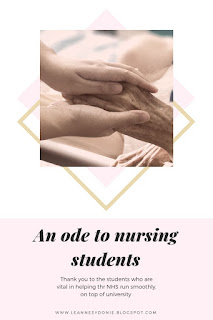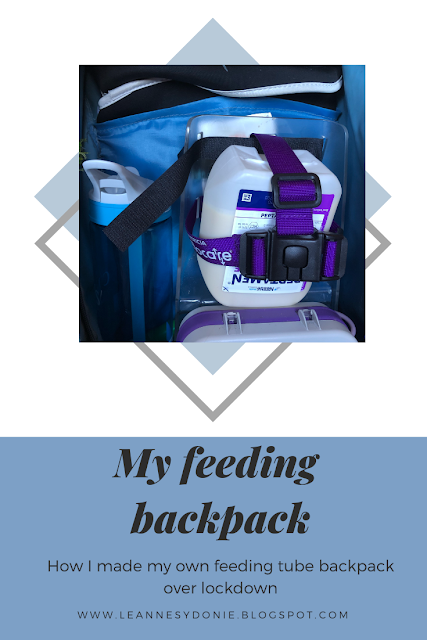An Ode to Nursing Students
A very specific type of anxiety: the worry that you’ll bump
into the nurses who looked after you in the hospital in the uni library.
My hospital is one of the largest teaching hospitals in the U.K. A team of five foundation [junior] doctors on placement follow the consultant on their ward round and diagnose, treat and use you as a teaching experience. If there’s a doctor on the ward after the ward round, chances are it’s a foundation doctor. One day a week, there is no consultant visiting you: it’s a registrar.
Student Nurses, on the other hand, do the same as the junior doctors. Student nurses are required to work 37.5 hour week placements, on top of their lectures and assignments, and in England, this is done without a bursary. The nursing students on placement on my ward were around my age; at the same stage of their education as I was at the end of my second year of university. They were helping run the ward, a few less nurses than usual, some sick, not enough agency staff in. Some students were older of course. Talking to one wearing the uniform of my university, she had three essays due at the end of the week, and yet I saw her in the mornings from 7 until late, Monday to Thursday. She worked hard, taking bloods and observations, removing cannulas, doing medicine rounds with a supervisor, helping ladies wash, use the toilet and clean their beds. She served food, spoke to the doctors on our behalf and learnt from the senior nurses around her while working as something slightly above a Healthcare Assistant, But not with the seniority of a nurse.
She was perhaps one of the most helpful people on the ward.
I found that the nights were fully staffed by qualified nurses, but nightshift
nursing in our bay was a lot easier than nursing it during the day: a single
medicine round, a couple of bed changes, a few calls for painkillers, four
hourly observations at a push. The patients on my ward were sleeping soundly,
and the ladies in with me weren’t high risk enough that the nurses needed to be
sitting at the top of the bay: the nurses were all in the nurses room at the
other end of the ward, laughing and joking, but fast over to any calls. This
obviously isn’t always the case: there will be high risk wards, there were a
couple of extremely stressful nights, the odd problem patient, but generally,
the qualified nurses doing nights had an easier ride than the student nurses
helping run the ward during the day.
After the colonoscopy that finally diagnosed my IBD as
crohn’s, I lay there sedated and nearly unconscious. Funnily enough, I shit
myself. Or maybe it was just liquid, I’m not sure. I just know it came out my
backside. It happens. For those
unfamiliar with colonoscopies, after the procedure you’re meant to pass the air that blew you up for the
endoscope [camera tube] to pass through your colon. If there is any poop
clinging to the walls of your colon after the ungodly bowel preparation the day
before [for me this means four litres of Kleen Prep laxative, two more litres of water, no food],
the endoscope shoots liquid to clear it away. Sometimes there’s some left after
the procedure, and if you’re not nearly unconscious, you can go to the toilet
to get rid of this. If you are still heavily sedated however, the nurses tell
you just to lay on your side and pass the
air. It was a student nurse in the recovery room at the endoscopy unit who
had to clean me up, and by god, if it wasn’t the lowest point of my hospital
stay. On every level, this future nurse was my peer: academically, roughly my
age, she even watched the same TV as me. [we spoke about it as a distraction
from the procedure, where I was extremely distressed as my colon was looking a lot more damaged than it was in my
first colonoscopy in January] And yet,
she unjudgementally wiped whatever I just passed away from my bottom; something
that hadn’t happened since I was in nappies.
If I think about other people I could possibly walk past on
my university campus, I’m sure there would be a lot of discomfort in cleaning
someone up. But not the nursing students. For the student nurses, this is their
job day in, day out, between lectures and essays.
Being truthful here, I spend 9 hours in lectures a week, and
struggle with the workload, as do many other students who are constantly
complaining about exams, assignments, and no free time. How on earth do the
nurses manage, with a much shorter summer break, working full time hours, while
also studying full time too. It’s seriously impressive.
Not only this, but after completing their studies, the
nurses are thrown straight into work: many of the fully qualified nurses on my
ward were 23-25. One 28 year old nurse joked to my mum that she was late to the
game, and felt much older than the others. These nurses are young and carrying
the wards. They are bloody heroes.
My greatest thanks to the nurses that look after all
patients unjudgementally. On my second hospital stay, I witnessed one very
confused patient continually shout, scream and hit the nurses. A bottle of
orange juice was even thrown over one of the nurses. When one of the male
nurses asked if he should step in, the nurse told him that it was alright; the
patient must think she was someone else. How many people would have the
patience to put up with that treatment unjudgementally? Nurses and nursing
students are worth their weight in gold. I still don’t want to bump into the
student who cleaned me up in the library, though.


Comments
Post a Comment